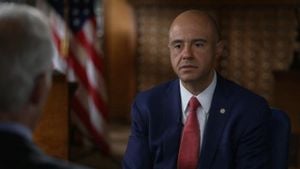Paris has witnessed severe turbulence surrounding the football match between France and Israel during the UEFA Nations League held on November 14, 2024. The high-stakes event saw the deployment of 4,000 police officers and 1,600 stadium personnel, reflecting the heightened security concerns stemming from past violent incidents.
Authorities sprang to action following reports of recent clashes involving Israeli supporters, which occurred just days before the match. Specifically, unrest from pro-Palestinian activists targeted Israeli fans during an earlier encounter between Ajax and Maccabi Tel Aviv, resulting in injuries to several individuals. The Paris Police Chief, Laurent Nuñez, characterized the match as high-risk, underscoring, "There is a tense atmosphere and ... [the] match is high-security for us.”
Law enforcement officials anticipated potential unrest manifesting not just within the stadium but across Paris, particularly with significant public transport passages leading to Stade de France. To mitigate risks, police implemented comprehensive security measures, including systematic checks for attendees and the establishment of an anti-terrorism perimeter around the venue. Multiple resources were allocated to monitor and secure both the stadium and the pathways leading to it.
Prior to the event, on November 10, Israel's National Security Council had already cautioned citizens to avoid public demonstrations abroad, citing potential threats of violence. This advisory was indicative of the fragile geopolitical climate overshadowing the match. Accompanying the warnings were scenes of organized pro-Palestinian protests occurring throughout Paris, demonstrating widespread dissent within the city's dynamic.
Within the venue itself, the atmosphere became increasingly charged. Footage captured moments of chaos when fights erupted among fans, leading to panic and people fleeing their seats. Although celebratory sportsmanship is often associated with such events, supporters were rendered fearful as violence seemingly spilled out, drawing onlookers' concerns for safety.
Accompanying the deployment of security personnel, Parisian authorities also engaged with Israeli security forces to synchronize efforts and bolster overall safety. The influence of key political figures was prominent, as French President Emmanuel Macron attended, elevaying the event's profile and security demands. His presence accentuated the gravity with which authorities viewed safeguarding the public during this match.
Those who managed to attend the match experienced heightened tensions reflected through fan interactions amid sporting chants and fanfare. Despite the escalated police presence, reports echoed sentiments of fear, and the event culminated with only around 20,000 tickets sold out of the potential 80,000 available, indicating apprehension among supporters.
Less than 150 Israeli supporters attended the match under police escort. Soccer coach Didier Deschamps remarked on the somber air surrounding the fixture, stating, "We’ve tried to prepare for this match as normally as possible. But obviously none of us within the team can be insensitive to such a heavy [environment].”
The conditions leading up to the match hark back to November 13, 2015, when the Stade de France was the site of one among several tragic terrorist attacks, which claimed numerous lives. Memories of this day continue to reverberate within the public consciousness, casting long shadows over current events.
Following the match, the finger was pointed at both sides, illustrating how sporting events can become contentious flashpoints intertwined with larger societal issues. Political responses aimed at mitigating such unrest remain pivotal as communities evolve and adapt to shifting tides.
With violent episodes marking the recent history of football encounters between passionate fan bases, the resulting confrontations accentuated the importance of security measures and reiterated the need for vigilance among attendees. For many, the hope was to witness sport unite and inspire, rather than divide and provoke.
Overall, the match exemplified the often-troublesome intersection between sport and real-world conflicts, exacerbated by past actions and present responses. The narrative surrounding the France-Israel match extends beyond the thrill of competition, pushing fans, officials, and law enforcement to confront the complex layers of emotion and turmoil inherent to this environment.



